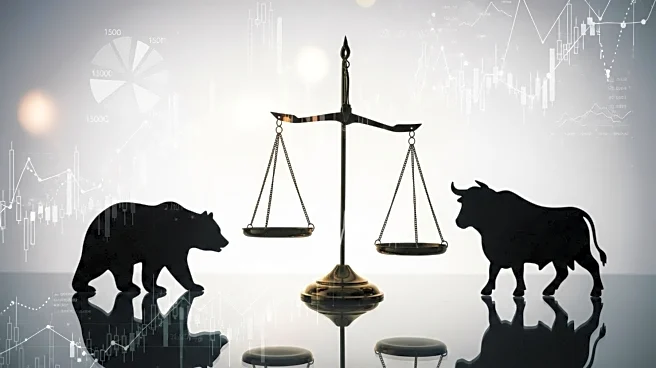What's Happening?
The VIX, a widely used measure of market volatility often referred to as the 'fear index,' has recently surged to its highest levels in months. This increase is attributed to renewed uncertainty surrounding the U.S.-China trade relationship, which has caused dramatic movements in major U.S. stock indexes. Despite the volatility, stocks remain near record highs, indicating that investors have not yet abandoned the market. The VIX rose to near 23, marking its highest point since late May, although it remains well below the levels seen in April during heightened trade-related uncertainty. The current geopolitical conditions, tariffs, and trade uncertainties are contributing to this volatility, according to JPMorgan Chase CEO Jamie Dimon.
Why It's Important?
The rise in the VIX index signifies increased market volatility, which can impact investor confidence and decision-making. As the U.S.-China trade tensions escalate, investors may seek safer assets, such as gold, which is currently around record highs. This shift could affect sectors differently, with more aggressive sectors like technology and discretionary stocks experiencing declines, while consumer staples see gains. The heightened volatility may lead to increased demand for downside risk protection, as noted by LPL Financial's Chief Technical Strategist Adam Turnquist. The situation underscores the fragility of investor sentiment in the face of geopolitical uncertainties.
What's Next?
If trade tensions between the U.S. and China continue to escalate, further volatility in the stock market is likely. Investors may increasingly turn to safe-haven assets, potentially driving up prices for commodities like gold. Additionally, sectors sensitive to trade dynamics may experience further fluctuations. Market analysts and strategists will closely monitor developments in trade negotiations and geopolitical events to assess their impact on market stability. The ongoing debate about whether the market is in a bubble will persist, influencing investor strategies and market movements.
Beyond the Headlines
The current market volatility highlights broader concerns about the sustainability of asset prices and the potential for sticky inflation. As geopolitical tensions and trade uncertainties persist, the risk of a market correction or bubble burst remains a topic of discussion among investors and analysts. The situation also raises questions about the long-term impact of trade policies on global economic stability and the role of government interventions in mitigating market risks.









